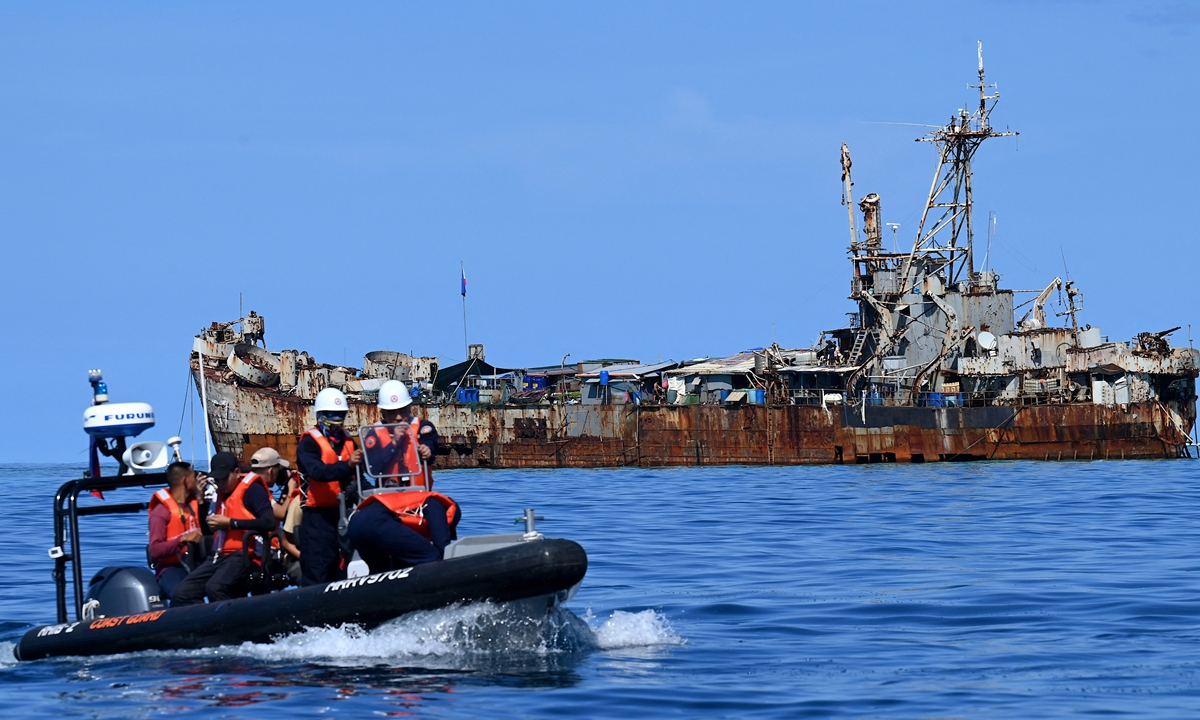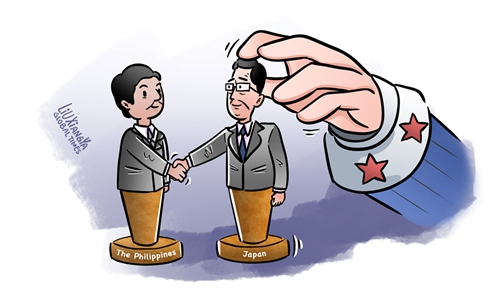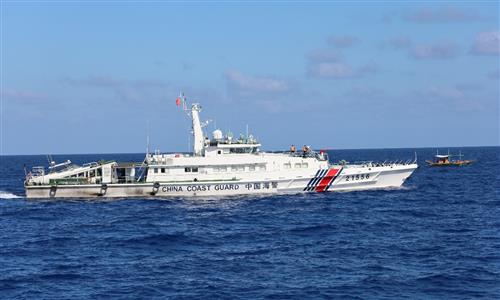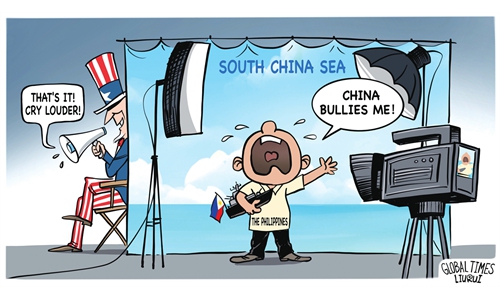IN-DEPTH / IN-DEPTH
Manila violating commitments, denying previous agreement and abandoning understandings escalate Ren’ai Jiao tensions: Chinese FM

This photo taken on November 10, 2023 shows Philippine coast guard personnel and journalists sailing onboard a rigid inflatable boat (left) as they head back after filming the BRP Sierra Madre grounded at Renai Jiao in South China Sea. Photo: AFP
If the Philippines truly wants to ease tensions at Ren’ai Jiao through dialogue and communication, it needs to honor the commitments and understandings and stop provocations, spokesperson of Chinese Foreign Ministry Mao Ning said at a press conference on Thursday.
Philippine President Ferdinand Marcos Jr. on Monday called on China to talk to prevent more incidents like ramming vessels and the use of water cannons in the South China Sea, Voice of America reported.
The Philippines continues to talk with China, and is exhausting all options to speak to Chinese leadership so as not to heat up tensions in the waterway, Marcos claimed, according to media report.
In response, Mao reiterated on Thursday China's indisputable sovereignty over the Nansha Islands, Ren’ai Jiao included, and their surrounding waters.
She stressed that China has always been committed to managing the on-site situation of Ren'ai Jiao through dialogue and consultation with the Philippines.
Mao reiterated that on how to deal with the current situation at Ren’ai Jiao, China’s position is clear-cut. First, by keeping its warship grounded at Ren’ai Jiao for decades running, the Philippines has been violating China’s sovereignty and the Declaration on the Conduct of Parties in the South China Sea (DOC), especially Article 5 which says refraining from action of inhabiting on the presently uninhabited islands and reefs. We demand that the Philippines tow away the warship at once and restore the Ren’ai Jiao’s state of hosting zero personnel and facilities.
Second, before the warship is towed away, if the Philippines needs to send living necessities, out of humanitarianism, China is willing to allow it if the Philippines informs China in advance and after on-site verification is conducted. China will monitor the whole process.
Third, if the Philippines sends large amount of construction materials to the warship and attempts to build fixed facilities and permanent outpost, China will not accept it and will resolutely stop it in accordance with law and regulations to uphold China’s sovereignty and the sanctity of the DOC.
The recent attempts by the Philippines to permanently occupy Ren'ai Jiao and Tiexian Jiao (Tiexian Reef) have seriously violated Article 5 of the DOC, said Lei Xiaolu, a professor of law with China Institute of Boundary and Ocean Studies, Wuhan University.
In 1999, the Philippines illegally grounded the “BRP Sierra Madre” warship on Ren'ai Jiao under the pretext of “mechanical failure” and promised to tow it away. However, in recent years, the Philippines has acted in bad faith, claiming to build permanent facilities on Ren'ai Jiao.
The Philippines believes the South China Sea arbitration case gives it a legal basis for the illegal occupation of Ren'ai Jiao, but in fact, the arbitral tribunal in the South China Sea arbitration case has no jurisdiction to handle sovereignty disputes over Ren'ai Jiao as part of the Nansha Islands. Tiexian Jiao is an uninhabited high-tide feature within 12 nautical miles of Zhubi Jiao (Zhubi Reef) and is part of the Nansha Islands, according to Lei.
If the Philippines' activities are tolerated, the dispute settlement mechanism established in Article 5 of the DOC will be weakened, potentially reopening the "Pandora's Box" of new round of island occupation by some countries, which will have a negative impact on regional peace and stability, Lei noted.
China and the Philippines established several channels of communication on the South China Sea issue, the most important one being the Bilateral Consultative Mechanism (BCM) established in 2016, noted Yan Yan, Direct of Research Center for Oceans Law and Policy, National Institute for South China Sea Studies.
The hotline between China and the Philippines coast guards was established after then Philippine President Rodrigo Duterte signed a memorandum of understanding (MOU) with China on cooperation between the two countries' coast guard in 2016 and is the most direct means of communication between the maritime law enforcement agencies of the two countries. In August 2023, Philippine Coast Guard spokesman Jay Tarriela announced the abandonment of this hotline mechanism, saying they will no longer be communicating directly with their Chinese counterpart.
In January of this year, the 8th meeting of the BCM was held in Shanghai. China and the Philippines agreed to "further improve the sea-related communication mechanism, continue to properly manage sea-related conflicts and differences through friendly consultations, and deal with maritime emergencies."
However, the Philippines' actions on Huangyan Dao and Ren’ai Jiao have not been curtailed despite the consultation. It seems that the Philippines’ strategy is to use action instead of words and dialogue, to show its presence and attempt to change the status quo in the South China Sea, Yan stressed.
China and ASEAN Foreign Ministers signed the DOC in November, 2002.
For the past 22 years, the DOC has served as a crucial political consensus and cornerstone for maintaining peace in the region. China and ASEAN countries have successfully engaged in various constructive maritime cooperation, including marine environmental protection, scientific research, safety of navigation and communication at sea, search and rescue operations, and combating transnational crime, in accordance with Article 6 which allows for cooperative activities pending a comprehensive settlement of disputes, said Yang Xiao, Deputy director of Institute of Maritime Strategy Studies at China Institutes of Contemporary International Relations.
Article 6 regulates cooperative activities among the parties concerned. These may include the following: marine environmental protection; marine scientific research; safety of navigation and communication at sea; search and rescue operation; and combating transnational crime, including but not limited to trafficking of illicit drugs, piracy and armed robbery at sea, and illegal traffic in arms.
However, beyond the positive momentum of promoting cooperation between China and most ASEAN countries, there has been some sort of noise off and on for some time, especially the Philippines which has repeatedly violated its commitments and obligations, Yang pointed out.
There is no doubt that “cooperation” is the most approved axiom paved by DOC for peace and development in the South China Sea ... Any actions or intentions that undermine these commitments and cooperation should be firmly opposed by all parties to DOC and by nations dedicated to peace and prosperity, Yang noted.
Global Times



